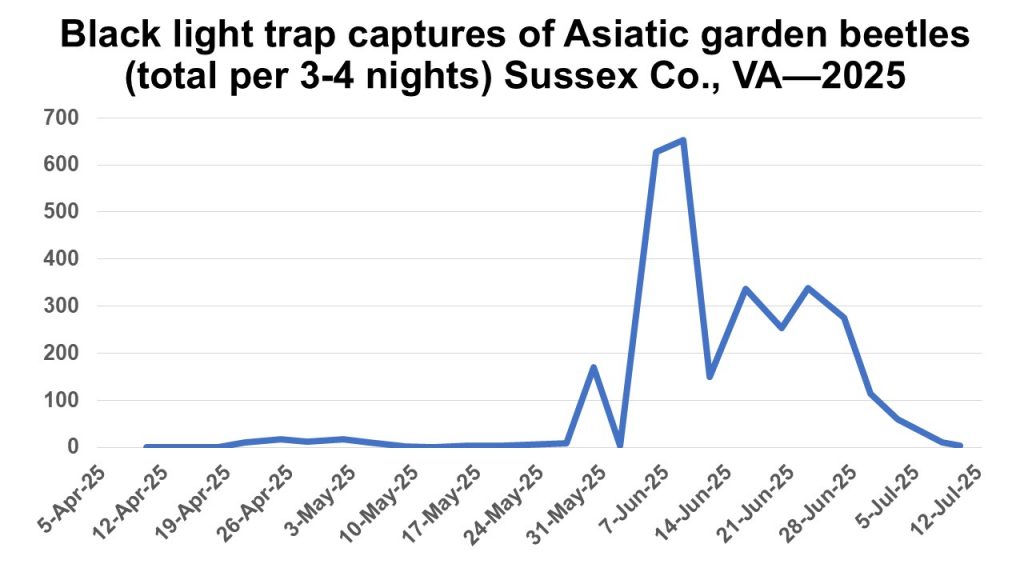Pheromone trap data from our cooperators across Virginia are in this Table. Virginia Cooperative Extension Agents Hélène Doughty (Northampton County) and Scott Reiter (Prince George County) reported many corn earworm larvae in soybean fields this week. Scott’s black light trap averaged 9.3 moths per night. With his help, our entomology program put in an insecticide efficacy experiment in Prince George soybean on August 20. The economic threshold calculator for corn earworm larvae in soybean can be found here. Our cypermethrin adult vial tests show 46% dead or down moths after 24 hours exposure time to this pyrethroid insecticide (n = 594 moths tested this season).
Author Archives: Sean Malone
Corn earworm/bollworm update–August 14, 2025
Updated corn earworm moth catches from our pheromone trap network are in this Table. Prince George County’s black light had 11 total moths over the past 8 nights, but high numbers were caught in that county’s pheromone trap (averaging 42.5 per night over the past 8 nights).
Today in a project supported by USDA-NIFA Crop Protection and Pest Management’s Extension Implementation Program, our entomology crew sampled cotton in Suffolk, VA with no genetic protection against bollworm and found 14% boll injury due to this pest in the insecticide-untreated plot. There was no boll injury due to bollworm in the insecticide-untreated WideStrike or Bollgard 3 plots.
Corn earworm update–August 7, 2025
The August 2025 corn earworm moth pheromone trap data (to date) can be found in Table 3. Some of the higher catches occurred in Brunswick, Prince George, and Rockbridge, VA. Last month’s data can be found in Table 2. Scott Reiter’s black light trap in Disputanta captured a total of 30 moths this week (6 nights).
We’ve evaluated 470 moths in our cypermethrin vial tests, with 48% dead/down after a 24-hour exposure to this pyrethroid insecticide at the 5 microgram/vial rate.
Corn earworm update–July 31, 2025
Pheromone trap catches of corn earworm (=bollworm) moths are available in this Table. The Prince George black light trap averaged approximately 13 moths per night this week and that county also had high pheromone trap catches. A peanut field at the Tidewater Agricultural Research and Extension Center in Suffolk, VA hit corn earworm larval threshold numbers (8 larvae per drop cloth sample) and we dropped in an insecticide efficacy experiment. We were finding 2.5 bollworm eggs per 100 cotton terminals this week in Suffolk. Our cypermethrin adult vials tests indicate 44% dead or dying moths after a 24-hour exposure to this pyrethroid insecticide (n = 340 moths tested from Suffolk).
Corn earworm (=bollworm) update–July 24, 2025
Corn earworm moth pheromone trap catches started to increase this week in some counties where captures have previously been low. The highest nightly averages were Brunswick (47), Prince George (30), Accomack (20), Greensville (15), Virginia Beach (13), and Southampton (11). Here is the Table. Black light trap catches at Prince George (Disputanta) averaged 3 per night. Cypermethrin vial test results are 53% dead or down moths after a 24-hour exposure to this pyrethroid insecticide at the rate of 5 micrograms per vial (n=178 moths tested). I found a bollworm egg in cotton on July 23 in Suffolk, VA.
Corn earworm update–July 17, 2025
Corn earworm moth nightly pheromone trap catches ranged from zero to 9 per night this week (here is the Table). Black light traps averaged 1.8 per night in Petersburg and 1.3 per night in Disputanta.
In our corn earworm adult vial tests with the pyrethroid cypermethrin (5 micrograms/vial rate), 62% of moths were dead or knocked down after a 24-hour exposure (64 moths from Suffolk, VA have been tested to date). We will continue to provide weekly updates on trap catches and vial test results.
Corn earworm moth pheromone trap update–July 10, 2025
This week’s corn earworm moth catches ranged from <1 to 13 per night in Virginia pheromone traps. Here is the Table. Also, Scott Reiter is operating two black light traps in Prince George, with nightly catches averaging 2 moths (Petersburg) and 0.7 moths (Disputanta).
Asiatic garden beetle–final trap data
Corn earworm pheromone trap update–July 3, 2025
Here are our two moth catch tables: June 2025 and July 2025. Some locations averaged over 20 moths per night (Brunswick, Virginia Beach). The Corn Earworm Moth Tracker site is under construction (we are still working out some bugs) and will allow users to filter data by county and date.


